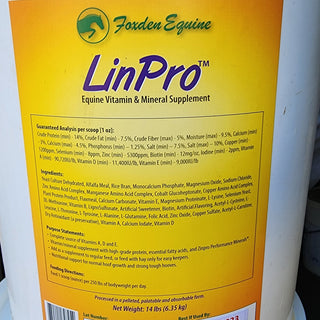Minerals come in two classes: micro and macro. Macro minerals are needed in larger quantities, usually in amounts up to a gram or more. These include calcium, magnesium, sodium, potassium, and chlorine. These minerals are either part of the structure of bone, or are involved in vital processes with in cells.
Micro minerals, also known as trace minerals, are usually part of enzymes and although they are needed in much smaller amounts, they are nonetheless essential. Iron, selenium, copper, zinc, cobalt and iodine are all examples. Horses require both macro and micro minerals to maintain their health. The best way to feed this is using a mineral balance pellet or supplement, like LinPro instead of feeding a mineral block.
Some examples of micro-nutrients include:
Calcium: Essential for strong bones and teeth, and helps regulate the horse's heart and nervous system.
Phosphorus: Works with calcium to support strong bones and teeth and is also involved in energy metabolism and muscle function.
Vitamin A: Essential for good vision and healthy skin and coat.
Vitamin D: Essential for the absorption of calcium and phosphorus and for strong bones and teeth.
Vitamin E: A powerful antioxidant that helps protect the horse's cells from damage and supports the immune system.
Iron: Essential for the production of red blood cells and the transport of oxygen in the horse's body.
Copper: Essential for the production of red blood cells and the health of the horse's nervous system.
Zinc: Essential for the horse's skin and hoof health, as well as for growth and development.
It is usually better to feed the minerals in a pelleted feed rather than included in a salt block because the salt limits a horse's intake and thus may result in a mineral deficiency.

